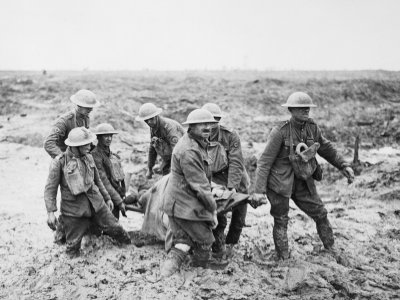
WHY VIOLENCE IS DECLINING IN THE WEST BUT THERE IS NO GUARANTEE IT WILL CONTINUE TO
Europe's peace since 1945 could yet be seen as a brief interlude. Let us hope and pray it is lasting.
Events to mark the centenary of the Battle of the Somme in the summer of 2016 remind us poignantly of the unimaginable losses incurred in five months of war over a paltry fifteen mile front. On the first day alone, British casualties amounted to over 57,000. By the end of the battle, over one million men would be killed or wounded.
In retrospect, this was the moment at which war in the western world would be interpreted as a senseless waste of life and soldiers would be seen as victims and not killers. The deep sensitivity to the plight of soldiers since has been shown in the public response to the Chilcot inquiry into the Iraq war where 179 personnel were killed.
Changing attitudes to violence in the west have been charted in a sympathetic and erudite way by Richard Bessel, Professor of Twentieth Century History at the University of York. Deeply held assumptions that we are becoming more violent, not less are challenged in Violence: A Modern Obsession (Simon & Schuster, 2015). Entertainment media belie this trend, with a relentless focus on physical aggression in the resolution of disputes. The pervasiveness of news media and its preoccupation with violence also does not help, but the truth is that life has become less violent for most, despite the hideous outbreaks of gun crime in the US and random acts of terrorism in Europe.
All this has happened in the course of a hundred years. We look at the shocking and inventive barbarity of Isis and assume it marks a return to the middle ages but the lynching of black people in the American south in the early twentieth century, in its planned cruelty, was worthy of Isis itself. For many of us, this is within the generation of our grandparents.
Bessel identifies seven reasons why violence in the west is in decline. These include: the public shock of two world wars; the economic boom which followed and which people wanted to protect; the greater stability of states which are able to preserve order; changes in life expectancy which make violent death seem exceptional and abhorrent; the transformation of the role of women in public life which has increased awareness and intolerance of domestic abuse; civil society itself becoming more distanced from war following the abolition of conscription; dramatic and involved communication of the impact of war through reportage, photography and citizen streaming.
In passing Bessel discourses on the growing role of religious violence in the modern world and concludes that ‘the conviction that religion can and should be equated with non-violence remains strong’. That this reasonable and evidentially based observation has to be made at all is depressing testimony to the easeful connection between religion and violence today. Historians will probably conclude this century was inaugurated by the attacks of 9/11, which sadly connects God to one of the worst acts of violence in peacetime.
At the end, Bessel notes:
[t]he protective shell that ‘civilisation’ provides is less solid than many would like to think…We may live in a largely peaceful society, in which violence is almost universally condemned, but we can never be sure it will not erupt again close to home.
These are sobering, carefully worded phrases. There can be no guarantee of peace for those in the west throughout the twenty-first century but those who suggest there may be worse to come are often dismissed as alarmist. Europe has experienced only a short period of peace since 1945 – allowing for the Balkan and Ukrainian wars, which are no small consideration. In the scheme of history, this could be seen as a brief interlude. We must hope not.
As religion is equated more often with violence, the Christian Church has a special calling to witness to the Prince of Peace and the prophetic imagination of Isaiah and a world where swords are beaten into ploughshares and spears into pruning hooks. To enable this, our theology must resist the infection of violence, our prayers must endure for peace and our public advocacy for reconciliation should find its integrity in personal practice. It remains a high calling from the Messiah who told Peter to put his sword away when fear overcame him in Gethsemane and who then submitted himself to the cross.
POPULAR ARTICLES

Obama's Covert Wars
The use of drones is going to change warfare out of all recognition in the next decades.

Through A Glass Starkly
Images of traumatic incidents caught on mobile phone can be put to remarkable effect.

What Are British Values?
Is there a British identity and if so, what has shaped the values and institutions that form it?


